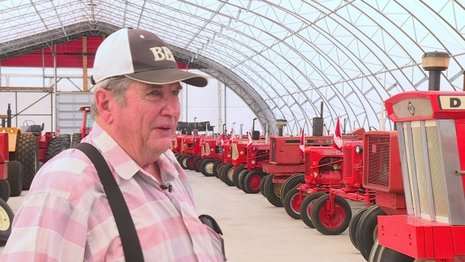George Nesbitt owns at least 300 tractors
By Diego Flammini
Assistant Editor, North American Content
Farms.com
Renfrew, Ontario’s George Nesbitt owns the world’s largest collection of Allis-Chalmers tractors.
According to CBC, Nesbitt's collection includes 400 tractors and could be values around $5 million CAN.
Nesbitt has so many tractors that he’s opened an online museum on his farm for tractor enthusiasts to visit. It includes everything from the early AC models to the AC 7000 series.
The museum features photos, specs and even the original purchase price. Visitors can also make their way to Nesbitt's farm for an in-person tour that can take about three hours.

George Nesbitt stands near his collection of Allis-Chalmers tractors.
Photo: Stu Mills/CBC
“(It’s) just a sickness you get,” he told CBC.
The 73-year old’s obsession with Allis-Chalmers tractors began when he was seven. He’d read his father’s tractors magazines and mailed away a request for more Allis-Chalmers information.
A salesman from an Allis-Chalmers dealer showed up at George’s door with the literature he asked for.
“So, I got literature and I wore it out, reading it,” he told CBC. “That hooked me on Allis-Chalmers.”
But Nesbitt’s journey to tractor collection took an unexpected twist.
Only two years into farming on his own, a fire destroyed his barn and killed the entire herd of dairy cows. When digging a hole to bury the cattle’s remains, he discovered a multi-coloured river stone.
The discovery of the stone led to the creation of Nesbitt Aggregates, which turns 50 in 2017.
Once the business was established and successful, Nesbitt returned to collecting tractors. In the slower winter months, enlists the help of some quarry employees to restore some of the tractors. A process that can come with a $40,000 price tag.
As he considers retirement, Nesbitt is deciding what to do with the business and his tractor collection.
“I always said, if I died, the funeral would be in the morning and the auction in the afternoon,” he told CBC.